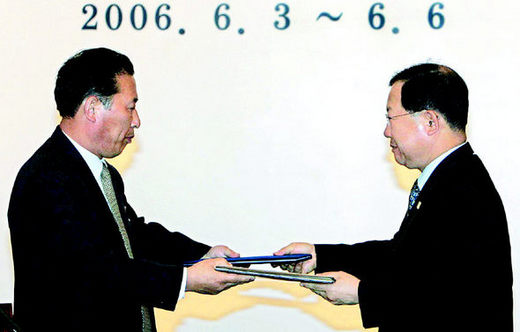Posted on : Jun.7,2006 09:27 KST
 |
|
Park Byung-won, South Korea's top negotiator at the 12th round of meetings of the South-North Economic Cooperation Promotion Committee, right, exchanges a copy of an agreement with North Korean counterpart Joo Dong-chan at Jeju on June 6. Seoguipo/Kim Tae-hyung
|
The agreement reached Tuesday between the two Koreas, linking the rail tests to the South’s cooperation in areas of light industry and underground natural resources, is a conditional one that leaves a few questions unanswered.
The North’s delegation wanted to have the final statement read only that tests would take place following "military guarantees" of safe passage. But the South demanded "more evolved and precise" wording, however, and insisted on linking the rail tests to the exchange of materials the North wants for its light industries. Ultimately, the actual phrase "rail tests" was not used in the official documents, serving to make acceptance easier for delegates from Pyongyang, but the North agreed to the mention of "linkage," a dramatic turn of events.
Tying the two items together was the South’s ploy to have a strong guarantee that the tests will in fact happen. "Making the carrying out of the agreement compulsory provides for a stronger agreement than having [to schedule yet another] date for rail tests," said Unification Ministry spokesman Kim Cheon-sik.
The light industry materials the South has agreed to give the North will be worth 80 million USD, half of what the North initially requested for a one-year period. The amount of materials to be exchanged after the first year will be determined at a later date. The biggest point of contention was how to make the exchange, but in the end that was stipulated in the final agreement: as payment for the raw materials, North Korea will repay 3 percent (2.4 million USD) by the end of the year in the form of zinc and magnesia clinker. The rest will be deferred for five years and paid within ten. The North will be required to pay 1 percent interest and 4 percent interest for any overdue funds, a first for any such agreement.
Several issues remain unaddressed. For example, additional discussions will have to determine practical matters, such as where mineral development should take place and how to build the infrastructure required for development.
The talks in Jeju are expected to put momentum back in inter-Korean relations, stalled since the North suddenly cancelled tests scheduled for May 25 of the railway linking the two Koreas. Had the North refused to go along with making a connection between the rail tests and the industrial help it wants, there would likely have been problems with any other agenda items the North might have wanted to bring up. "We repeatedly told the North’s delegates that the public is angry that the rail tests didn’t take place, and that they would accept nothing less," said one government official. It is believed that the North’s dire economic situation and the lack of sufficient basic necessities influenced its willingness to accept the development of the joint railroad in the first place.






